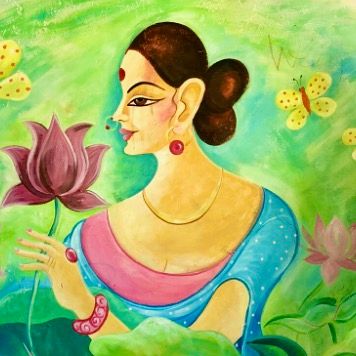Menopause & post-menopause

During menopause, a big transition is made in the women’s body: the menstruation will stop. The word “menopause” comes from the ancient Greek language: men meaning month, and pause meaning that something will stop.
You can experience various physical, mental and emotional symptoms of imbalance. Some examples are hot flashes, disturbed sleep, feeling frustrated, skin problems, hair loss, lack of libido and/or digestive issues. Each woman can experience differents symptoms, and at a different age.
Ayurveda sees menopause as part of the ageing process of a woman. An Ayurveda lifestyle and diet can contribute to creating more balance and harmony in your life during this period of transformation. I will share some of them with you below.
Lifestyle
Do a self massage at least two or three times a week with cold pressed organic sesame oil. Add a few drops of lavender essential oil to help calm the mind.
Go to sleep, get out of bed every day at the same time. Sleep before 10 PM, get up between 6-7 AM.
Yin Yoga and/or Yoga Nidra in the evening can help to relax and calm down the mind to fall asleep more easily.
Spend time in nature, especially close to the water. The sea, a river or a lake. Water calms and balances.
Diet
CCF tea
Take equal quantities of cumin seed, coriander seed and fennel seed and put them in a jar. Take one teaspoon in a tea bag or metal tea ball and put in a cup of boiled water. The combination of these spices supports digestion and has a detox effect on the tissues.
Warm spiced milk
If you have difficulties falling asleep or disturbed sleep, a cup of boiled organic (full-fat cow or almond) milk with a pinch nutmeg and half a teaspoon cardamom in the evening can help to calm down and get ready for bed. Sweeten with agave- or maple syrup and add a teaspoon of Ghee.
Golden milk with Ghee
Heat one teaspoon of Ghee in a small saucepan and add half a teaspoon of turmeric, half a teaspoon of cinnamon, 3 slices of fresh ginger, a pinch of black pepper and a pinch of cardamom. Be careful to not burn the spices! Then add one cup of organic (almond or full-fat cow) milk and stir until it cooks. Sweeten with agave- or maple syrup.
Ghee
Use Ghee for cooking and baking. And add a teaspoon of Ghee in every warm meal.
Kicheri
This is one the most important dishes in Ayurveda as it nourishes the tissues, aids the digestive system and balances the Doshas.
Food combinations
When cooking, take care of the food combinations you are making as these can balance or harm your system. See my blog with an overview of food combinations to avoid.
Recommended food products
- Protein rich foods like (mung) beans, lentils, seitan, almonds, eggs;
- Quinoa;
- Amaranth;
- Millet;
- Raw nuts and seeds like walnuts, sesame seeds, sunflower seeds and pumpkin seeds. Soak the nuts in water and roast seeds in a dry pan before eating, that makes them easier to digest;
- Green leafy veggies;
- Organic soy.
- Cardamom;
- Ginger;
- Ceylon Cinnamon;
- Coriander (seeds and fresh leafs);
- Mint;
- Chamomile;
- Turmeric;
- Fennel seeds.
Ayurvedic medicinal herbs*
Ashwaghanda
This powerful herb is also called a “Rasayana” in Sanskrit, or “rejuvenator”. It has many beneficial effects, as it strengthens the nervous system, has anti-inflammatory properties, improves circulation, improves immunity, improves hormonal balance, and has calming properties, just to name a few.
Shatavari
The herb for every woman. This herb has adaptogenic properties, it adapts to your metabolism. It is a great herb to improve hormonal balance, has calming properties and improves digestion.
*Always consult with your Ayurvedic therapist or -doctor before taking Ayurvedic medicinal herbs.

